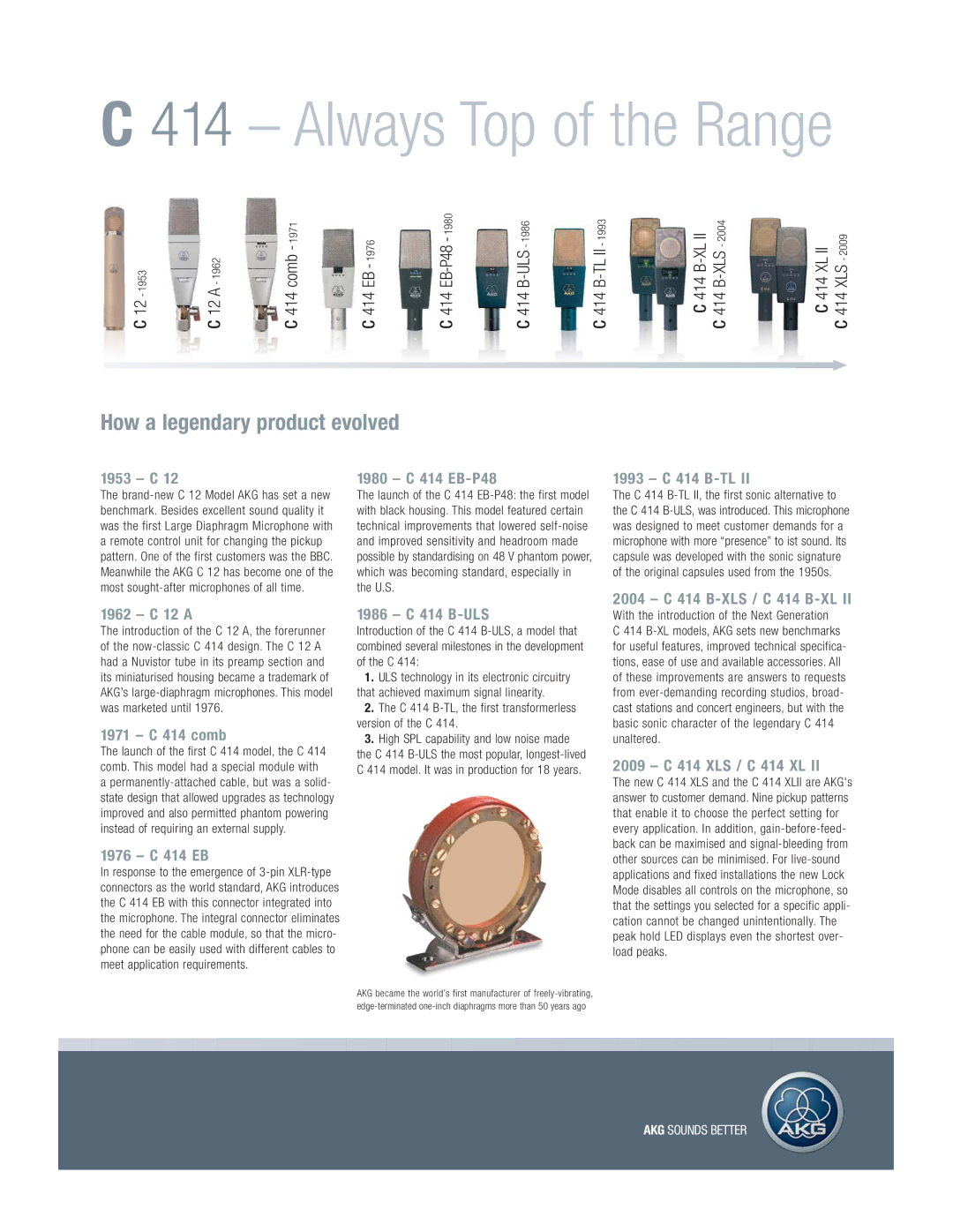1953 – C 12
The brand-new C 12 Model AKG has set a new benchmark. Besides excellent sound quality it was the first Large Diaphragm Microphone with a remote control unit for changing the pickup pattern. One of the first customers was the BBC. Meanwhile the AKG C 12 has become one of the most sought-after microphones of all time.
1980 – C 414 EB-P48
The launch of the C 414 EB-P48: the first model with black housing. This model featured certain technical improvements that lowered self-noise and improved sensitivity and headroom made possible by standardising on 48 V phantom power, which was becoming standard, especially in the U.S.
1993 – C 414 B-TL II
The C 414 B-TL II, the first sonic alternative to the C 414 B-ULS, was introduced. This microphone was designed to meet customer demands for a microphone with more “presence” to ist sound. Its capsule was developed with the sonic signature of the original capsules used from the 1950s.
2004 – C 414 B-XLS / C 414 B-XL II
1962 – C 12 A
The introduction of the C 12 A, the forerunner of the now-classic C 414 design. The C 12 A had a Nuvistor tube in its preamp section and its miniaturised housing became a trademark of AKG’s large-diaphragm microphones. This model was marketed until 1976.
1971 – C 414 comb
The launch of the first C 414 model, the C 414 comb. This model had a special module with
apermanently-attached cable, but was a solid- state design that allowed upgrades as technology improved and also permitted phantom powering instead of requiring an external supply.
1976 – C 414 EB
In response to the emergence of 3-pin XLR-type connectors as the world standard, AKG introduces the C 414 EB with this connector integrated into the microphone. The integral connector eliminates the need for the cable module, so that the micro- phone can be easily used with different cables to meet application requirements.
1986 – C 414 B-ULS
Introduction of the C 414 B-ULS, a model that combined several milestones in the development of the C 414:
1.ULS technology in its electronic circuitry that achieved maximum signal linearity.
2.The C 414 B-TL, the first transformerless version of the C 414.
3.High SPL capability and low noise made the C 414 B-ULS the most popular, longest-lived C 414 model. It was in production for 18 years.
AKG became the world’s first manufacturer of freely-vibrating, edge-terminated one-inch diaphragms more than 50 years ago
With the introduction of the Next Generation
C414 B-XL models, AKG sets new benchmarks for useful features, improved technical specifica- tions, ease of use and available accessories. All of these improvements are answers to requests from ever-demanding recording studios, broad- cast stations and concert engineers, but with the basic sonic character of the legendary C 414 unaltered.
2009 – C 414 XLS / C 414 XL II
The new C 414 XLS and the C 414 XLII are AKG's answer to customer demand. Nine pickup patterns that enable it to choose the perfect setting for every application. In addition, gain-before-feed- back can be maximised and signal-bleeding from other sources can be minimised. For live-sound applications and fixed installations the new Lock Mode disables all controls on the microphone, so that the settings you selected for a specific appli- cation cannot be changed unintentionally. The peak hold LED displays even the shortest over- load peaks.

